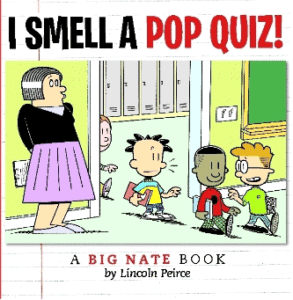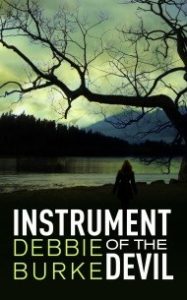 Time for a pop quiz to test your knowledge of sneaky word traps writers can fall into.
Time for a pop quiz to test your knowledge of sneaky word traps writers can fall into.
Today let’s talk about homonyms, homographs, and homophones.
Homonyms are words that sound the same but have different meanings.
Example: “write” and “right.”
Homophones are words that sound alike but have different meanings and spellings.
Examples: rein, reign; aisle, isle; suite, sweet.
Homographs are words that are spelled the same but have different meanings and different pronunciation.
Example: desert (a hot dry place, pronounced with an accent on the first syllable) or desert (to leave, accent on the second syllable).
Don’t worry—the above definitions won’t be on the test. Only hardcore grammar Nazis care.
Some words are just plain confusing. They may sound similar but are spelled differently and have different meanings.
But…professional writers should know how to choose the right word in a particular sentence.
We’ve all typed “there” when we mean “their” or “to” when we mean “too.” Those fall more into the category of typos.
I’m talking about out-and-out goofs because of incorrect word choices. When your book is published, some readers are quite happy to point out those errors that you missed. Embarrassing.
Standards of proofreading and copyediting are on a steep decline. The below examples are boo-boos I’ve collected lately from recently published books, news articles, and blog posts.
See if you can make the right choices.
- Juicy gossip (a) peeked (b) peaked (c) piqued her interest.
- The hangman held the rope (a) taut (b) taught.
- The professor (a) honed (b) homed in on the novel’s theme.
- The study (a) sited (b) sighted (c) cited research from the Mayo Clinic.
- A serial rapist is careful to (a) allude (b) elude capture.
- The eyewitness (a) poured (b) pored over the photo lineup of suspects.
- A new zoning ordinance was brought before the city (a) council (b) counsel.
- Floodwaters (a) reeked (b) wreaked (c) wrecked havoc in homes along the river.
- A depressed person can suffer from (a) deep-seeded (b) deep-seated anxiety.
- The state must reduce the budget by (a) paring (b) pairing expenses.
- Skateboarders are getting a bad (a) rap (b) wrap.
- The (a) effect (b) affect of the new court ruling will (c) effect (d) affect millions of people.
How many of you looked up the test answers on Google? Come on, tell the truth.
That’s OK. It’s not cheating–it’s research. The lesson here is it’s always better to double-check before you submit to an agent or editor who might turn you down because of improper use. Or before you hit the “publish” button on your indie book.
Self-published books carry a stigma because many are full of such errors. If you’re an indie author, don’t contribute to the bad reputation with sloppy word choices.
Now that I’ve reached a certain age, I may think I’m sure about proper usage but sometimes find I’m mistaken. When it’s so easy to check on sites like Grammar Girl or Writing Forward there really is no excuse not to.
Answers:
- (c) piqued.
- (a) taut.
- (b) homed. “Honed” means sharpening a blade.
- (c) cited.
- (b) elude. “Allude” means to refer to.
- (b) pored.
- (a) council. “Counsel” refers to advice or legal help, e.g. The judge said, “Let counsel approach the bench.”
- (b) wreaked.
- (b) deep-seated.
- (a) paring.
- (a) rap.
- (a) effect, (d) affect. These two words are constantly mixed up. Effect is a noun (The effect of the ruling). Affect is usually a verb (The ruling will affect millions)…unless it refers to a blank facial expression known as “flat affect.” Then it’s a noun.
Not only that, affect is a homograph (spelled the same but pronounced differently). When used as a verb, the accent is on the second syllable. When used as a noun, the accent is on the first syllable.
No wonder writers get confused. Glad I was born in the USA because I’d never master the vagaries of English if I had to learn it as a second language!
TKZers, how did you do on the quiz?
Which homonyms, homophones, and homographs do you find confusing?
What words do you tend to mix up?
Do you have favorite tricks or tips that remind you of correct usage?
During October, here are two ways to get a cheap thrill:
Debbie Burke’s bestselling thriller Instrument of the Devil is on sale for $1.99; or if you’re a member of Amazon Prime, you can read it for free. Click here.


One of my big annoyances is those who use “likely” (synonymous with “probable”) when they mean “probably.” Another was a news anchor who kept alluding to a weapons “cachet” (he wanted “cache”). *grin*
Most news anchors have no cachet at all!
Thanks, Harvey.
100%
The peek/peak/pique error bugs me, although when typing “sneak peek” the fingers somehow want to type “sneak peak” but there’s still no excuse for not proofing.
One I’ve seen way too often recently in (traditionally pubbed books) is pedal/peddle. Those characters weren’t selling their bikes, either.
Another author damned the creek to create a pond.
My “wow, I didn’t know that” came from a reviewer who pointed out I’d used discrete instead of discreet. My editor missed it, too. Learned my lesson on that one.
The tricky part is when (as above) you don’t know you’ve used the wrong word, so you don’t look it up.
Terry, I can’t keep discreet and discrete straight either. You’re so right about not knowing that you’ve used the wrong word. That’s why we have to keep educating ourselves.
Gold star for your 100%!
100%
And English *is* my second language. One of my biggest challenges is refraining from capitalizing every noun in sight. So for my historical fiction I invented my own rule: Reverential Capitalization. !
(forgot to add: German is my native language)
Harald, extra credit for earning 100% as a non-native speaker. I took one year of German in high school and appreciate your “Reverential Capitalization” rule.
Got em all right, but those were easy. 🙂
Speaking of grammar Nazis…I got into a tussle with an editor once over the usage of “like” versus “as if”. Example: He was acting as if he were insane. That’s how a grammar nut wants it, complete with subjunctive case — were vs was. But I was in my character’s point of view and normal folks tend to say “like” instead of “as if.” The editor tried to fight me to the mat over this and finally had to EXPLAIN intimate pov to her. I won.
But don’t ask me to explain lay and lie in all their weird tenses. I have to look it up every time and even then I’m not sure.
Too many smart folks at TKZ, Kris. Next time I’ll have to make the test harder 🙂
Colloquial and conversational misuse is completely justified, no matter what grammar Nazi editors think. Good for you for sticking to your guns.
I got a 100 on the quiz, but I had to think very hard about “wreaked.”
Raze/raise trips me up. I always have to think twice about the verb effect (as in to bring about) because I want to type affect. And I need to say choose out loud to know if I should write choose or chose.
If I do a whole document search for my typical errors, like chose and choose, I can usually catch ’em before anyone else sees them.
Smart idea to keep track of your personal errors, Priscilla. I’ll adopt that idea for my blind spots. Thanks!
I watched a movie recently (can’t remember the title) with the subtitles turned on. The words “peek,” “peak,” and “pique” were all used in the movie. And they were all wrong! Something like “Her interest was peaked so she piqued out the window at the mountain peek.”
I was running on the treadmill at the time and I had to stop and admire this peak of verbal impropriety. I wasn’t sure whether to laugh or cry.
I only recently became aware that the noun “blond” is masculine while “blonde” is feminine.
I loved the quiz!
Thanks, Kay! Your movie subtitles made me laugh b/c I too have noticed huge boo-boos in foreign films. Being a translator ain’t easy.
Love this quiz. “Piqued” v. “Peek” really sets my teeth on edge when it’s wrong. And what about the (nameless) big-time author who had a “laundry shoot.” I’d love to shoot my laundry, but prefer a laundry “chute.”
Well, shoot, Elaine, that’s a hoot! Thanks for the smile.
10 out of 12 – but I hadn’t finished my first coffee for the day (that’s my excuse & I’m sticking with it.)
Craig, you’re entitled to a do-over after your caffeine.
100%. Which shocks me. I don’t think of myself as a grammar guru.
You don’t have to be a grammar guru to be educated, Brian. Good job.
100%, but that’s because you didn’t include lay, laid, and lie. Those trip me up every time! Thank God for editors. I’d be lost without mine. 🙂
I know what you mean, Sue. There are certain words I can never keep straight, no matter how many times I look them up.
100 %
For me it is capital and capitol. Everytime I write it I question myself. And everytime I proof read the section I question it again. Now I highlight it and put a check mark in the comment section to remind myself THIS IS RIGHT.
Literally had an argument with 4 people, writers, that cite is a correct. spelling and this is how it is used.
Another good example of sneaky homonyms, Michelle. Highlighting and check marks in the margin are tricks I’ll be adopting. Thanks!
100% which amazed and amused me. I often get effect and affect muddled so have to think those ones through with care. For once, I was correct.
Good work, Roland. TKZers are such professionals, I’m going to have to work to find harder questions!
I will confess to getting deep-seated wrong.
Because they sound similar, seated and seeded are easily confused. Thanks for participating, Anthony.
I got an A+:) Got them all right. Loved the Pop Quiz! Let’s have a few more…..
Gold star, Frances. Glad the quiz was fun. I’ll work on another one.